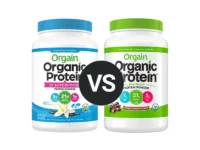Knowledge BaseYou're Questions Answered
How does protein powder impact gut health?
Protein powder is a convenient supplement used to increase dietary protein intake, often derived from sources like whey, casein, soy, pea, and hemp. While it offers numerous benefits, including supporting muscle growth and recovery, its impact on gut health can vary depending on the type of protein, added ingredients, and individual sensitivities. Below, we explore the potential effects of protein powder on gut health, both positive and negative.
Positive Impacts on Gut Health
-
Protein and Gut Barrier Function
Adequate protein intake is essential for maintaining the integrity of the gut barrier, which prevents harmful substances from entering the bloodstream. Some protein powders contain specific amino acids, such as glutamine, that support gut barrier function and intestinal health1. Glutamine is known to be a key fuel source for enterocytes, the cells lining the intestines, and can help maintain the integrity of the gut lining.
-
Prebiotic Ingredients
Some protein powders are fortified with prebiotic fibers, such as inulin or chicory root fiber, which can promote the growth of beneficial gut bacteria. Prebiotics serve as food for probiotics, the good bacteria in the gut, and can help improve gut health by enhancing the balance of the gut microbiota2.
-
Digestive Enzymes
Many protein powders include added digestive enzymes like protease, lactase, or bromelain, which can aid in the digestion and absorption of proteins. These enzymes help break down proteins into smaller peptides and amino acids, making them easier to digest and reducing the risk of digestive discomfort3.
Potential Negative Impacts on Gut Health
-
Lactose Intolerance and Dairy Sensitivity
Whey and casein protein powders are derived from milk and may contain lactose, a sugar that can cause digestive issues in lactose-intolerant individuals. Symptoms like bloating, gas, and diarrhea can occur if lactose is not properly digested. For those sensitive to lactose, lactose-free protein powders or alternative sources like soy or pea protein may be better options4.
-
Artificial Additives and Sweeteners
Some protein powders contain artificial sweeteners, flavorings, and fillers that can negatively impact gut health. Ingredients like sucralose, aspartame, and sugar alcohols (e.g., sorbitol, xylitol) can cause gastrointestinal discomfort in some people, including bloating, gas, and diarrhea5. Additionally, artificial additives can potentially disrupt the gut microbiota balance.
-
High Protein Intake
Excessive protein intake, especially from concentrated sources like protein powders, can strain the digestive system. Some individuals may experience constipation, bloating, or other digestive discomforts due to the increased load on the digestive tract6. It is important to consume protein powders within recommended guidelines and ensure a balanced intake of other nutrients, such as fiber, to support digestion.
Considerations for Gut Health
-
Choosing the Right Protein Powder
To minimize potential negative impacts on gut health, opt for protein powders with minimal artificial additives and natural ingredients. Look for options with added digestive enzymes or prebiotics, which can support digestion and gut health.
-
Gradual Introduction and Moderation
When introducing a new protein powder into your diet, start with a smaller serving and gradually increase to the recommended amount. This allows your digestive system to adjust and reduces the risk of gastrointestinal discomfort. Also, maintain a balanced diet with adequate fiber intake to support overall gut health.
-
Monitoring Individual Responses
Since individual responses to protein powders can vary, it's important to pay attention to how your body reacts. If you experience persistent digestive issues, consider trying a different type of protein powder or consult with a healthcare professional or nutritionist for personalized advice.
- Van Wijck, K., Lenaerts, K., Grootjans, J., Wijnands, K. A., Poeze, M., Van Loon, L. J., ... & Dejong, C. H. (2011). Physiology and pathophysiology of splanchnic hypoperfusion and intestinal injury during exercise: strategies for evaluation and prevention. American Journal of Physiology-Gastrointestinal and Liver Physiology, 303(2), G155-G168.
- Gibson, G. R., & Roberfroid, M. B. (1995). Dietary modulation of the human colonic microbiota: introducing the concept of prebiotics. The Journal of Nutrition, 125(6), 1401-1412.
- Strawford, A., Antelo, F., Christiansen, M., & Hellerstein, M. K. (2004). Adverse effects of amino acid infusions in humans: a randomized study. American Journal of Clinical Nutrition, 80(3), 314-320.
- Heyman, M. B. (2006). Lactose intolerance in infants, children, and adolescents. Pediatrics, 118(3), 1279-1286.
- Magnuson, B. A., Burdock, G. A., Doull, J., Kroes, R. M., Marsh, G. M., Pariza, M. W., ... & Williams, G. M. (2007). Aspartame: a safety evaluation based on current use levels, regulations, and toxicological and epidemiological studies. Critical Reviews in Toxicology, 37(8), 629-727.
- Mortensen, L. S., Hartvigsen, M. L., Brader, L. J., Astrup, A., & Raben, A. (2012). Differential effects of protein quality on postprandial lipemia and incretin responses in adults with type 2 diabetes: a randomized controlled trial. American Journal of Clinical Nutrition, 95(4), 662-671.
Related Questions

Your Answer
We are a participant in the Amazon Services LLC Associates Program, an affiliate advertising program designed to provide a means for us to earn fees by linking to Amazon.com and affiliated sites.





